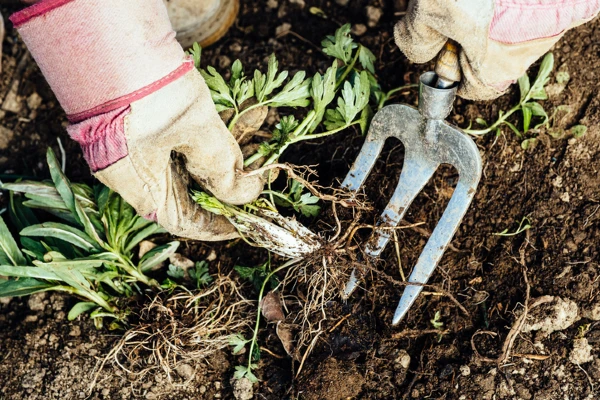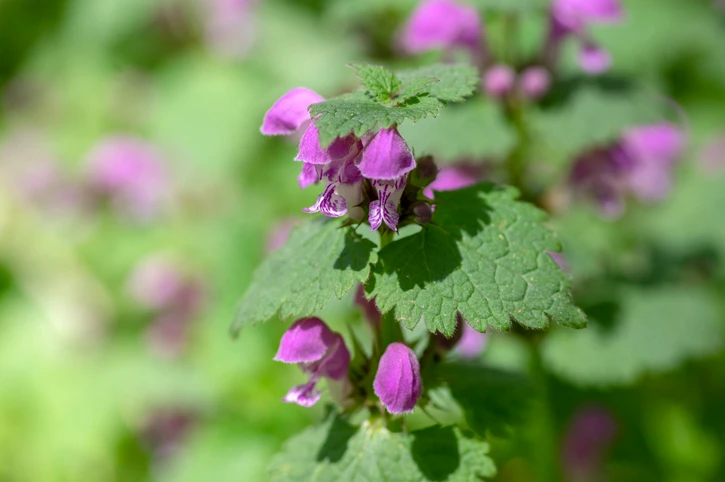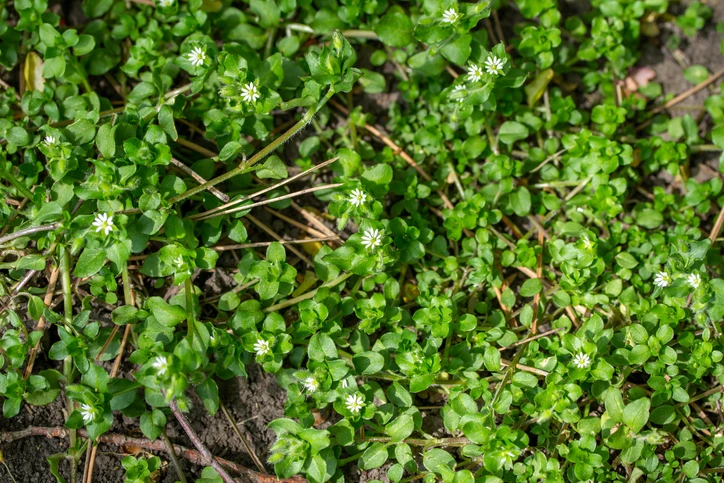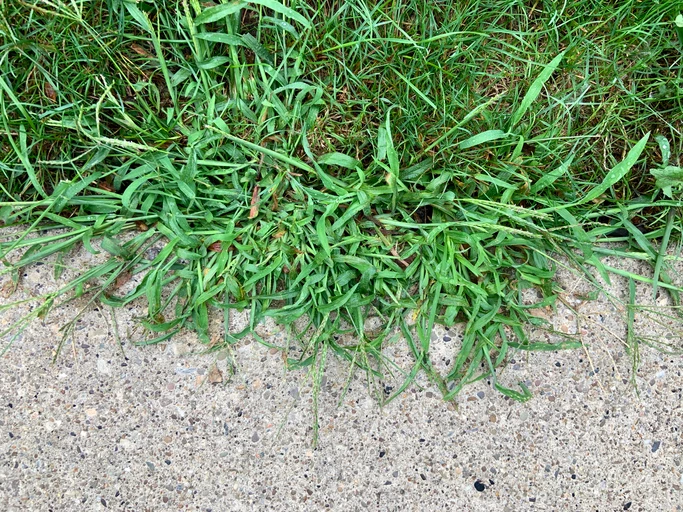7 Tips for Garden Weed Control & Turf Care in Summer

When it comes to weeds, the struggle is real.
The one thing people want to know is: How do I keep weeds out of my garden and stop them from returning? If you ask most people, they’ll tell you weeds are the bane of their existence because they can quickly take over a pristine yard and turn it into an unkempt mess. Unfortunately, you can do everything right regarding lawn care, only to have weeds reappear. So, what do you do? Weed control is the best option to treat pesky overgrown weeds and protect your turf long-term.
The misconception is when the term “weed control” is mentioned, many assume it means store-bought products that can potentially damage the soil and kill healthy plants. For The Grounds Guys of Gettysburg, weed control is a strategic effort to keep harmful weeds at bay. So, let’s get into the best ways to keep weeds out of your garden.
Weeds Native to and Found in Gettysburg, PA
Before we go in-depth about garden weed control, we need to identify some of the weed genera native to and typically found in the area. After all, it’s better to know a little about the weeds you’re trying to eliminate so that you can implement effective methods. You’ll find purple deadnettle and chickweed are two native weeds that many locals struggle to combat. Still, other weeds common in our area are crabgrass and dandelions.
Purple Deadnettle (Lamium Purpureum)

If you’re a fan of mint, you might find purple deadnettle a weed with an appealing aroma but is still a pesky weed at the end of the day. This genus is a part of the mint family and grows in areas where the soil is often disturbed, like fields and flower beds and gardens around buildings with a lot of foot traffic.
How to avoid this weed genus: Purple deadnettle grows in disturbed soil, so always be on alert for this weed in garden beds around commercial buildings and soil where people tend to walk frequently.
Chickweed (Stellaria Media)

Chickweed is an annual winter weed and another bothersome species that you’ll find growing in and around Gettysburg. What’s unique about this weed is it grows in areas with thin turf and invades highly moist and well-watered soil. You may typically find chickweed growing under or around bushes and trees, as the shade can promote growth. The best weeding tip to eliminate chickweed is to catch it as early as possible. Weeding at the beginning of fall will help you keep these weeds out of your flower beds.
How to avoid this weed genus: If you’re in the midst of lawn seeding or sod installation, choosing a dense turf is the best pre-emptive garden weed control for this weed type.
Pro Tip: Selecting the most appropriate turfgrass involves some considerations, including the amount of sun, foot traffic, irrigation; soil depth; and maintenance requirements. Because of harsh Pennsylvania winters, Kentucky Bluegrass is one of the most durable, adaptable, and winter-hardy turf of all grass types.
Crabgrass (Digitaria)

Don’t be fooled by the look and name; crabgrass is a perennial and opportunistic weed that loves growing in thin, bare turf spots, much like chickweed. This weed species germinates in spring and dies in fall but can produce thousands of seeds in that time. These broadleaf weeds can grow through cracks in concrete and dense soil. Crabgrass is a malignant weed that steals sustenance from nearby plants, choking off nutrients and slowly killing healthy grass.
How to avoid this weed genus: Manual weeding and breaking up densely packed soil are some of the best ways to get rid of crabgrass, but also ensuring you’re mowing at the proper height can deter this annoying weed. For optimal crabgrass control, your mower blades should be 8.8 cm off the ground.
Dandelions (Taraxacum)

Believe it or not. Dandelions weren’t always classified as weeds. Before the twentieth century, gardeners would make room for dandelions in flower beds. Now, these whimsical perennial weeds are found growing indiscriminately in untidy lawns, landscape ornamental beds, and nurseries. Dandelions are known to produce deep taproots, making manual weeding challenging. They’ve essentially mastered survival, siphoning water from other plants and pushing up grass to make room for its roots.
How to avoid this weed genus: As we said before, dandelions have taproots that grow deep and are strong, so hand weeding can prove ineffective for dandelion control. However, you can purchase dandelion pullers from reputable retailers to locate and remove the deep-set roots. Herbicides are also an effective method before the flower emerges. After that point, they are more resistant to this type of weed control.
7 Weed Control Tips & Tricks to Protect Your Turf
While you can’t entirely prevent weeds from growing, there are effective strategies to reduce weed seed propagation and reproduction.
1. Try to Apply Pre-Emergent as Early As Possible
Typically, you’ll want to apply weed control before spring germination (roughly 10-14 days prior). Most weeds tend to germinate when the temperature reaches between 55- and 58-degrees Fahrenheit (12.7- and 14.4-degrees Celsius). Pre-emergent herbicides should be applied to your lawn in early spring or fall to discourage weed growth, and turf shouldn’t be watered 48 hours after application.
2. Re-Apply Weed Control Solutions
Like most things, performing a task once isn’t always enough to master it or ensure it takes effect. With weed control, reapplication is key. Weed seedlings are distributed across every square inch of your lawn. However, only the top inch or two of soil gets enough nutrients to trigger weed germination. As a result, weeds can appear anywhere there’s adequate light and water, meaning you have to be diligent about weed control application.
3. Minimize Soil Disturbance
Weeds are typically attracted to areas with frequent soil disturbance. Even manual weeding can cause weed growth, so it’s important to use narrow and sharp tools that penetrate the soil and slice through roots without disturbing the surrounding earth. Remember, seeds can remain dormant for months, even years.
4. Fertilizer is Your Friend
Weed control doesn’t always involve aggressively pulling plants or disconnecting root systems. Often, effective weeding means caring for the soil. Efficient mulching keeps plants moist and deprives weeds of sunlight. Many types of organic fertilizer are insect-friendly, inviting carabid beetles and crickets into beds to eat weed seeds and reduce germination.
5. Be Careful Where You Water
Water is a life-giving resource for humans and plants. When watering healthy greenery, you also unknowingly provide nutrients to weed species. So, you have to be mindful about where you’re watering to ensure you’re not giving weeds a chance to thrive. Drip irrigation can help you avoid watering weed seeds and get water directly to plant roots for healthy turf and seasonal color.
6. Pull Weeds When Wet
After heavy rainfall, weeds are more tenable and easier to remove from flower beds. You’ll still need sharp and pointed tools to locate taproots and avoid soil disturbance. Once you pull weeds, they can still be useful to strengthen your turf. You can recycle weeds by composting them, but the key is to keep the compost piles hot to dry out and kill the seeds. An unconventional way to kill weed seeds is to heat the composting pile in an old crockpot and raise the temperature to 160 degrees Fahrenheit.
7. Seek Professional Weed Control Support
Weed control can be time-consuming if you’re the sole caregiver for your lawn. Maybe your schedule doesn’t allow time for lawn care and weed control; that’s where our exceptional team at The Grounds Guys of Gettysburg comes in!
We offer three distinct weed control packages that include:
- Organic Lawn Care Program – Our organic lawn care option is the reigning king of our programs, providing you with natural and eco-friendly products that keep weeds out of your garden, create healthier and stronger soil, and protect the rest of your plants by avoiding harsh chemicals.
- Traditional Lawn Care Program – If you want fast results, our traditional turf care program releases nutrients over a shorter period for enhanced aesthetics. With this option, you may require more lawn maintenance.
- Hybrid Lawn Care Program – You get the best of both worlds with our hybrid lawn care program, combining organic weed-killing fertilizer with traditional fertilizer. Your lawn will be more resilient against drought and require less upkeep.
Regardless of the program you choose, our Gettysburg lawn care specialists are ready to support you in keeping weeds out of your garden for good.
Call (717) 216-4847 for a free estimate, and we’ll happily set up a consultation to determine the best lawn care options for you.


